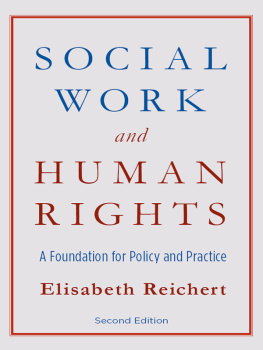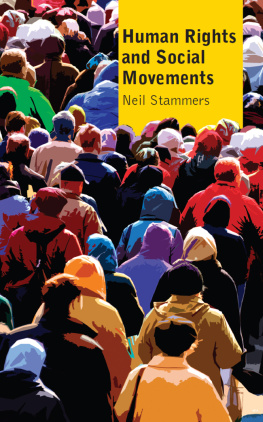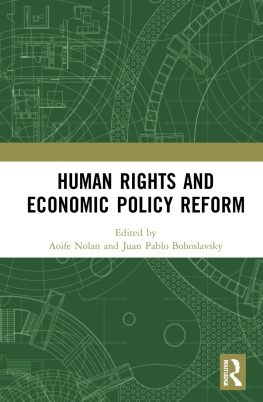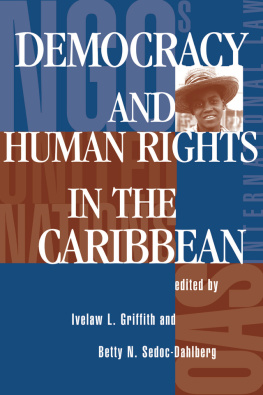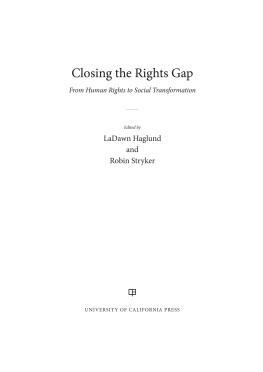Social Work and Human Rights
Social Work and
Human Rights
A Foundation for
Policy and Practice
SECOND EDITION
ELISABETH REICHERT
Columbia University Press New York
Columbia University Press
Publishers Since 1893
New York Chichester, West Sussex
cup.columbia.edu
Copyright 2011 Columbia University Press
All rights reserved
E-ISBN 978-0-231-52070-6
Library of Congress Cataloging-in-Publication Data
Reichert, Elisabeth.
Social work and human rights : a foundation for policy and practice /
Elisabeth Reichert.2nd ed.
p. cm.
Includes bibliographical references and index.
ISBN 978-0-231-14992-1 (cloth : alk. paper)ISBN 978-0-231-14993-8 (pbk. : alk. paper)
ISBN 978-0-231-52070-6 (ebook)
1. Social service. 2. Human rights I. Title.
HV41.R433 2011
361.2dc22
2011011912
A Columbia University Press E-book.
CUP would be pleased to hear about your reading experience with this e-book at .
References to Internet Web sites (URLs) were accurate at the time of writing. Neither the author nor Columbia University Press is responsible for URLs that may have expired or changed since the manuscript was prepared.
Contents
6. Human Rights and Children, Persons with Disabilities,
Persons with HIV-AIDS, Gays and Lesbians, Older Persons,
and Victims of Racism
Today, no government, professional association, or organization purporting to help others would dare say that it is against human rights principles. In this updated version of the 2003 book by Dr. Reichert, she highlights this point with utmost clarity, scholarship, and passion. By placing human rights within its historical context (as one should) and viewing human rights as a powerful social construct that arose from the ashes of World War II and in the 21st century an idea that moves people to action, the reader immediately comes to understand the urgent need of the world community not to look the other way as it did during the Holocaust. Or, for that matter, as it did during genocide against Indigenous Peoples, promotion of the Trans-Atlantic Slave Trade, and perpetration of other atrocities. Some of these tragic occurrences still exist today, like extreme poverty, where worldwide close to one billion people go to bed starving each night.
Today, globalization, actually corporatization, in collusion with governments, a military structure, and educational system, has taken root with a burgeoning of policy euphemisms and flowery language like free trade agreements, structural adjustment, and the like. Yet human rights principles, especially those enshrined in the United Nations Universal Declaration of Human Rights, drafted in part under the able leadership of an American, Eleanor Roosevelt, and upon a foundation constructed from President Franklin Delano Roosevelts Four Freedoms speech of 1941, may hold the key to a socially just world. President Roosevelt envisioned a world free from fear and from want, where every person, everywhere, also had freedom of expression and the right to worship. Dr. Reichert shows us, with particular and keen attention to the profession of social work, how to unlock this key.
A major theme of this work is that no one wants to be accused of violating the human rights of others, not only of citizens, but of friends, colleagues, clients, patients, teachers, and students. As Eleanor Roosevelt eloquently stated, human rights begin at home, in our neighborhoods, and in our workplace. The problem is that people, particularly those in the United States where there is an alarming dearth of knowledge about human rights principlesan irony given U.S. historical leadership heretend to have meager, if not narrow, viewpoints of definitions of human rights, violations of which always seem to take place in foreign lands, never in the United States. The author broadens the readers perspective by describing in detail poignant articles, not only of the Universal Declaration, but of some of the many important documents that came after the Universal Declaration and that pertain, more specifically, to women, children, people with disabilities, Indigenous Peoples, persons with mental illness, and development.
She also takes on the rather thorny issue of the interdependence and indivisibility of rights, describing struggles involved in guaranteeing civil and political rights, such as freedoms of speech and the press with economic, social, and cultural rights such as rights to medical care, adequate shelter, and meaningful and gainful employment, and even with solidarity rights like the rights to peace and self-determination. After all, what is freedom of speech to a person who is homeless and lives in a world at war? Dr. Reichert is fully aware of the connection and invites the reader to join her in exploring these struggles and challenges, which are at the forefront of the social work profession. Dr. Reichert shows us that social work has always been a human rights profession, from its inception to contemporary times. She humbly acknowledges and rightly so that human rights is not the panacea for everything, but the concept of human rights does have the power to move people, as well as provide an excellent framework within which to debate issues and expand our parochial consciousnesses. There is truly joy in this struggle.
Unique to this up-to-date and timely work is a thorough knowledge of the profession of social work, particularly as many of its ethical and practice issues relate to human rights principles. Dr. Reichert correctly states, for instance, that the social work professions Code of Ethics with its emphasis on human dignity, self-determination, social justice, and social change reads like a mini Universal Declaration of Human Rights. Her practice examples also illustrate how human rights principles, which can further delineate and define more accurately the worthwhile and important, but often nebulous, concept of social justice, can be applied in practical situations.
Eleanor Roosevelt wanted the Universal Declaration of Human Rights to be a document for the lay person, not for someone with a doctorate in jurisprudence. Certainly students of human rights should examine noteworthy legal cases, such as the precedent-setting decision of Filartiga v. Pena (1980), which ruled that many provisions of the Universal Declaration should be considered customary international law, which all nations must abide. Yet the essential thrusts of human rights documents, which legally mandate the fulfillment of human need, pose obligations upon governments. These obligations ought to mirror the will of the people by informing them of their fundamental rights because they are human, and not because they are white, black, red, brown, or yellow; male, female, transsexual, bisexual, or intersexed; young, middle-aged, or old; or any other attribute, other than the fact that they are human.
Yes, information is power. After reading Social Work and Human Rights, I am sure that the reader will become armed with a vast array of human rights knowledge and further energized to wage peace and to create a socially just world, as a citizen of the world. If every bomb made is theft from the poor as former U.S. president Dwight D. Eisenhower asserted, and if the world will be a better place once the peacemaker, not the warrior, is praised as former President John Fitzgerald Kennedy stated, such a socially just world, constructed from the pillars of human rights, ought to bring us closer to a human rights culture: a lived awareness of human rights principles in our minds and hearts and dragged into our everyday lives. This awareness ought to result in a global consciousness reflecting millennia of spiritual wisdom to treat each other like we would like to be treated and to do our duties to one another in a spirit of brotherhood [and sisterhood] as asserted in Article 1 of the Universal Declaration of Human Rights.

